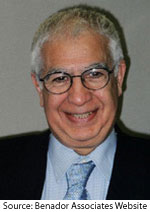Rest in Peace, Roger Garaudy! |
In one spring almost a decade ago, I was having coffee with two French intellectuals at a Parisian café when we were distracted by a commotion.
Several patrons of the café started moving from their tables as if hit by an invisible hand as an elderly man approached, trying to sit at one of the tables. One of the patrons was shouting: Oh, how it smells ill!
The cause of the commotion was the elderly newcomer who turned out to be Roger Garaudy, the bete-noire of French intellectuals and the subject of this voluminous exercise in character demolition. The intellectual patrons of the café did not wish to be anywhere close to Garaudy, the pariah par excellence.
Shunned in his own homeland, Garaudy was, nevertheless, a hero in other places.
A few weeks after the café incident, Garaudy was in Tehran as a guest of President Muhammad Khatami, receiving honours reserved for visiting heads of state. In June 1999, Jordanian intellectuals named Garaudy "the most important international cultural personality of the 20th century." Former Syrian Vice President Abdul-Halim Khaddam has called Garaudy "the greatest contemporary Western philosopher." Libyan leader Muammar Kaddhafi has gone even further by designating Garaudy as "Europe's greater philosopher since Plato and Aristotle."
There are other places where Garaudy is a star.
In the Islamic Republic of Iran, the 84 years old Frenchman is a household name among Khomeinist officials and militants. The state-owned television often broadcasts lengthy interviews with the old man who has maintains a private correspondence with former President Khatami. Last December when the Islamic Republic's Foreign Minister Manuchehr Motakki hosted an international conference to prove that the Holocaust did not happen, Garaudy, unable to attend for health reasons, sent a videotape message supporting President Mahmoud Ahmadinejad's call for Israel to be wiped off the map.
How did Garaudy end up where he is today?
This biography traces a complicated itinerary that, in a sense, is not very different from that of his generation. Born at the start of the First World War, Garaudy was one of those European intellectuals who witnessed such cataclysmic events as the Communist Revolution in Russia, the Popular Front experiment in France, the rise of Nazism in Germany, and the Second World War. In an ear of dramatic and often violent change, Garaudy and his contemporaries were constantly looking for certainties that could help them avoid falling into the chasm of despair. Many Western European intellectuals were seduced by Communism, and ignored the atrocities committed by Stalin in the Soviet Union and by Mao in China.
Communism was appealing because, basing itself on a misunderstanding of Marxism, it claimed that there was such a thing as History with a capital H and that it evolves in accordance with pre-determined laws.
All that one needs do is to discover those laws and accelerate their operation towards a Utopian future.
Seduced by Marxism, young Garaudy joined the French Communist Party and quickly became an aide to Maurice Thorez, the party's secretary general and a long-time agent of the Komintern. Garaudy was the author of the French Communist Party's notorious dictum: " In every just thought, Stalin is there; in every just action, Stalin is there!"
As the authors of this biography show, Garaudy was the PCF's hatchet man when it came to attacking authors such as Arthur Koestler who exposed Stalin's crimes.








 Amir Taheri is author of 11 books on the Middle East, Iran and Islam. He has been a syndicated columnist for American, British, and Middle Eastern publications since the 1980s. He has edited newspapers and magazines in his native Iran as well as Britain and France. In 2005, Taheri was named Senior Fellow at the National Committee on American Foreign Policy.
Amir Taheri is author of 11 books on the Middle East, Iran and Islam. He has been a syndicated columnist for American, British, and Middle Eastern publications since the 1980s. He has edited newspapers and magazines in his native Iran as well as Britain and France. In 2005, Taheri was named Senior Fellow at the National Committee on American Foreign Policy.
Post new comment